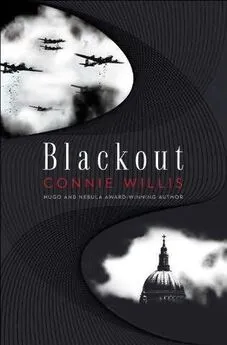Connie Willis - Blackout
- Название:Blackout
- Автор:
- Жанр:
- Издательство:неизвестно
- Год:неизвестен
- ISBN:нет данных
- Рейтинг:
- Избранное:Добавить в избранное
-
Отзывы:
-
Ваша оценка:
Connie Willis - Blackout краткое содержание
In her first novel since 2002, Nebula and Hugo award-winning author Connie Willis returns with a stunning, enormously entertaining novel of time travel, war, and the deeds—great and small—of ordinary people who shape history. In the hands of this acclaimed storyteller, the past and future collide—and the result is at once intriguing, elusive, and frightening.
Oxford in 2060 is a chaotic place. Scores of time-traveling historians are being sent into the past, to destinations including the American Civil War and the attack on the World Trade Center. Michael Davies is prepping to go to Pearl Harbor. Merope Ward is coping with a bunch of bratty 1940 evacuees and trying to talk her thesis adviser, Mr. Dunworthy, into letting her go to VE Day. Polly Churchill’s next assignment will be as a shopgirl in the middle of London’s Blitz. And seventeen-year-old Colin Templer, who has a major crush on Polly, is determined to go to the Crusades so that he can “catch up” to her in age.
But now the time-travel lab is suddenly canceling assignments for no apparent reason and switching around everyone’s schedules. And when Michael, Merope, and Polly finally get to World War II, things just get worse. For there they face air raids, blackouts, unexploded bombs, dive-bombing Stukas, rationing, shrapnel, V-1s, and two of the most incorrigible children in all of history—to say nothing of a growing feeling that not only their assignments but the war and history itself are spiraling out of control.
Blackout - читать онлайн бесплатно полную версию (весь текст целиком)
Интервал:
Закладка:
There was a checkpoint at Folkestone, and another at Hythe, both manned by armed guards who questioned him and examined his papers before letting him through. “Have you seen any suspicious strangers on the road?” they asked him at the second checkpoint, and when he told them no, said, “If you see any unauthorized persons on a beach or behaving suspiciously, asking questions or taking photographs, contact the authorities.”
That’s why the retrieval team hasn’t come, Mike thought as he drove, because Badri hasn’t been able to find a drop site. The whole coast had been crawling with soldiers, coastwatchers, and aircraft spotters ever since Dunkirk. Not only that, but every single farmer and driver and pub-frequenter was watching for paratroopers and spies. There was no way the retrieval team could have come through anywhere inside the restricted area without being noticed, and if they’d come through outside it, they’d have run into the same problems getting to Saltram-on-Sea he was having. No wonder they hadn’t found him yet.
I didn’t alter the future, he thought jubilantly. I didn’t lose the war. And if I can just get to the drop without changing anything else, I’ll be home free.
If I can get down to the beach, he amended, looking at the chalk cliffs, which were getting steeper with every mile. On the plus side, the military was apparently counting on those cliffs being enough to stop the tanks. The only defenses on the beaches below were two lines of stakes and some barbed wire.
It had begun to rain just outside Hythe. Mike peered through the windshield at the white road and occasional glimpses of gray ocean beyond the cliffs, looking for landmarks he recognized. The road moved away from the Channel again and then back, climbing. He had to be getting close-
There it was. The road went up a small hill, and at the top he could see all the way to Saltram-on-Sea and past it. He pulled the car off onto the grass and got out, scowling for the benefit of anybody who might be watching, and slammed the door angrily. He yanked up the hood and bent over it. He wished he knew how to make steam billow up, so it would look like the car had overheated, but he had no idea how a gasoline engine worked, and he didn’t dare risk its really conking out.
He pretended to adjust a few things, and then smacked the fender hard with his hand as if fed up and limped over to the edge of the cliff and looked disgustedly out at the gray Channel, the gray sky, and then down at the beach. A sharp jut in the cliffs blocked his view of the drop, but he could see most of the rest of the beach. There were the same stakes and barbed wire here, but no machine-gun nests, no guard posts, no razor wire. Good.
Unless the beach was mined. But the drop was only a little way from the cliff’s edge, and mines were much more likely to be near the water’s edge, or in between the tank traps. They were expecting an invasion from the beach, not from the land.
It was windy here on top of the hill, and freezing standing in the misty rain. He pulled the collar of his jacket up around his neck, wishing he hadn’t sold his overcoat. Especially if it took a while for the drop to open. But it shouldn’t. The good thing about all this barbed wire and the wretched weather was that he wouldn’t have to worry about anyone being out in it, including coastwatchers. And if there were any boats out in that choppy water, which he doubted, their crews’ eyes would be trained on the Channel, not on the beach. So he should have a clear shot.
If he could get to the drop. He walked a little farther, trying to see around the jutting cliff, but it was still in the way. He went back to the car, got in, pretended to try the ignition, then got out again and limped north along the road as if looking for a house where he could ask for help. When he judged he was past the jutting cliff, he hobbled out to the edge again.
The drop was clearly visible from here. He could see the rock’s two sides sticking jaggedly up out of the sand. And between them in the middle, right on top of the drop site, a six-inch artillery gun.
And there sprang up all around the park briars and brambles, twined one within the other, so that no one could pass through.
– “SLEEPING BEAUTY”London-October 1940
POLLY STARED SICKLY AT DOREEN, STANDING THERE SOBBING in the middle of the bustling tube station, oblivious to the people pushing past them. “Hit?” she repeated, thinking, Marjorie’s dead. That’s why she didn’t tell anyone she was leaving.
“And the worst part…” Doreen said, trying to talk through her tears, “oh, Polly, she was in the rubble for three days before they found her!”
Marjorie’s poor mangled body had lain there for three days. Because no one knew she was there. Because no one even knew she was missing. “But her landlady said she’d left,” Polly said, “that she’d taken her things. Why-?”
“I don’t know,” Doreen said. “I asked her, but she said they won’t let her in to see Marjorie-”
“Let her-she’s alive?” Polly said, grabbing both of Doreen’s arms. “Where is she?”
“In hospital. Mrs. Armentrude-that’s her landlady-said she’s very badly hurt… her insides…”
Oh, God, Polly thought. She has internal injuries.
“Mrs. Armentrude said she had a ruptured spleen…”
Polly felt a surge of hope. They’d known how to deal with a ruptured spleen, even in 1940. “Did she say anything about infection?”
Doreen shook her head. “She said some of her ribs were broken and… and… her arm!” And broke down completely.
People didn’t die from broken arms in any century, and if peritonitis hadn’t set in, Marjorie might be all right. “Here, my dear,” Miss Laburnum was saying, offering Doreen a lace-edged handkerchief. “Miss Sebastian, would you like me to fetch your friend a cup of tea from the canteen?”
“No, I’m all right,” Doreen said, wiping at her cheeks. “I’m sorry. It’s only that I feel so dreadful that I was angry at her for going off and leaving us shorthanded, when all the time…” She began to cry again.
“You didn’t know,” Polly said, thinking, We should have. I should have known she wouldn’t have gone off to Bath without telling me, that she wouldn’t have let me down when she’d said she’d cover for me-
“That’s what Miss Snelgrove said,” Doreen sniffled, “that it was no one’s fault. That even if we’d known Marjorie was still in London, we wouldn’t have known where she was. I don’t know what she was doing in Jermyn Street. She must have been on her way to the railway station when the raid began.”
But Jermyn Street’s nowhere near Waterloo Station, Polly thought. It’s in the opposite direction.
“Imagine, thinking you’ll be safely out of London soon, and then…” Doreen began to cry again. “I only wish there were something we could do, but Mrs. Armentrude said she’s not allowed any visitors.”
“Perhaps you could send her flowers,” Miss Laburnum suggested, “or some nice grapes.”
“Oh, that’s a good idea,” Doreen said, cheering up. “Marjorie always liked grapes. Oh, Polly, she’ll be all right, won’t she?”
“Yes, of course she will,” Miss Laburnum said, and Polly looked gratefully at her. “She’s in good hands now, and you mustn’t worry. Doctors can do marvelous things. Why don’t you stay here in the shelter with us tonight?”
“I can’t, thank you,” Doreen said to Miss Laburnum and turned to Polly. “Miss Snelgrove asked me to tell everyone, and Nan still doesn’t know. I must find her and tell her.”
“But you can’t,” Polly said. “The sirens will be going any minute now, and you’ve no business being out in a raid.”
“It’s all right. Nan’s usually at Piccadilly,” Doreen said, and looked vaguely around at the notices painted on the wall. “Does the Piccadilly Line run from here?”
“You take the District to Earl’s Court and change from there,” Polly said. “I’ll go with you. Miss Laburnum, tell Sir Godfrey I’ve gone to help a friend locate someone.”
“Oh, but we were to rehearse the shipwreck scene tonight,” Miss Laburnum said. “Sir Godfrey will be so cross.”
She was right. He’d thrown himself into the role not only of butler, but of director, and bellowed at everyone, including Nelson. And if she missed a rehearsal-
“No, no, you needn’t go with me,” Doreen was saying. “I’m much better now. Thank you both.” She handed Miss Laburnum back her handkerchief and hurried off.
“How dreadful!” Miss Laburnum said, looking after her. “To be trapped like that without anyone knowing where you are. You mustn’t feel badly, Miss Sebastian. It wasn’t your fault.”
Yes, it was. I should have known something was wrong, but I was too busy worrying about whether she’d spoken to the retrieval team. I am so sorry, Marjorie.
She went to the hospital the next morning, but all they would tell her was that “the patient is stable,” and that she wouldn’t be able to have visitors “for some time.”
“Perhaps Miss Snelgrove will be able to find out more from the doctors,” Doreen said, passing round a card for everyone to sign with cheerful comments like “Hitler 0, Marjorie 1.”
Polly was doubtful, given Miss Snelgrove’s less-than-charming manner, but she returned full of information. They had operated successfully to remove Marjorie’s spleen; there appeared to be no other damage except for the arm and four broken ribs, and she was expected to make a full recovery, though it would be at least a fortnight before she was able to return to work. She’d lost a good deal of blood.
“She was under several feet of rubble,” Miss Snelgrove said. “It took the rescue squad nearly a day to dig her out after they found her. She was lucky to have been found at all. The house was listed as empty in the ARP ward records. The elderly woman who owned it had shut it up and gone to the country when the bombings began.”
And what was Marjorie doing in an abandoned house? Polly wondered.
“-so the rescuers hadn’t even looked for anyone. If an air-raid warden making his rounds hadn’t heard her calling from under a section of collapsed wall-” Miss Snelgrove shook her head. “She was very lucky. She was apparently in a sort of recessed doorway.”
Like the drop, Polly thought, remembering that night with the bombs falling all around. If the wall had collapsed on the passage, no one would have known she was there either.
“Did they let you in to see her?” Sarah Steinberg, who’d been sent down to fill in for Marjorie, asked.
“No, she’s still much too ill to have visitors,” Miss Snelgrove said. “I gave the matron your grapes and your card, and she promised to deliver them to her.”
“And you’re certain she’s going to be all right?” Doreen asked.
“Quite sure,” Miss Snelgrove said briskly. “She’s in excellent hands, and nothing can be gained by worrying. We must concentrate on the task at hand.”
For the next week, Polly tried to do just that-concentrating on selling stockings, wrapping parcels, learning her lines and her blocking-but she kept seeing Marjorie buried in the rubble: frightened, bleeding, waiting for someone, anyone, to come dig her out. And if she’d been unconscious or unable to call for help, she’d still be there, and no one would ever have known what happened to her.
“Lady Mary!” Sir Godfrey roared at her. “That’s your cue!”
“Sorry.” She said her line.
“No, no, no!” Sir Godfrey bellowed. “You are not on a picnic. You have been shipwrecked. Your vessel has been blown off-course, and no one has any idea where you are. Now, try it again.”
Читать дальшеИнтервал:
Закладка:

![Jane_BlackCat - Понять не поздно... [СИ]](/books/1148838/jane-blackcat-ponyat-ne-pozdno-si.webp)
![Jane_BlackCat - За краем Вечности [СИ]](/books/1148839/jane-blackcat-za-kraem-vechnosti-si.webp)

